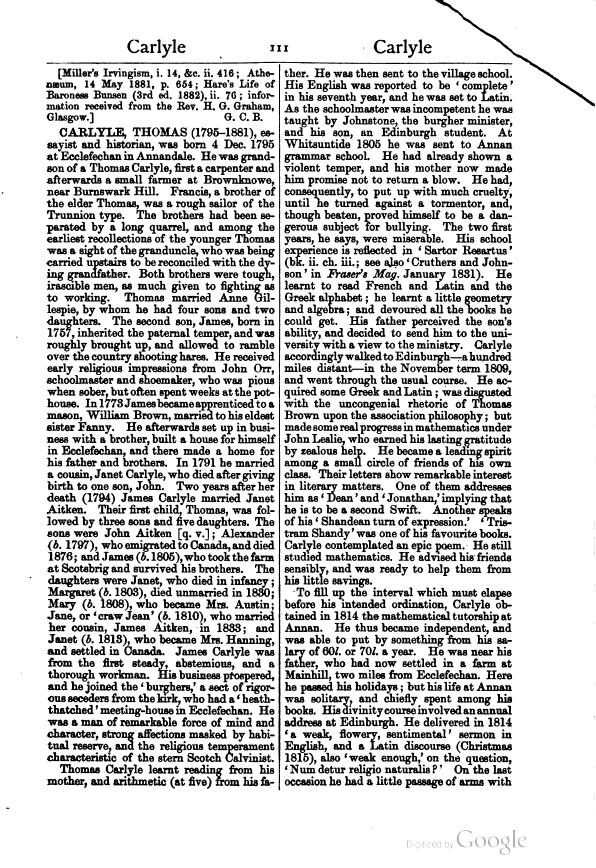[Miller's Irvingism, i. 14, &c. ii. 416; Athenæum, 14 May 1881, p.654; Hare's Life of Baroness Bunsen (3rd ed. 1882), ii. 76; information received from the Rev. H. G. Graham, Glasgow.]
CARLYLE, THOMAS (1795–1881), essayist and historian, was born 4 Dec. 1795 at Eccledechan in Annandale. He was grandson of a Thomas Carlyle, first a carpenter and afterwards a small farmer at Brownknowe, near Burnswark Hill. Francis, a brother of the elder Thomas, was a rough sailor of the Trunnion type. The brothers had been separated by a long quarrel, and among the earliest recollections of the younger Thomas was a sight of the granduncle, who was being carried upstairs to be reconciled with the dying grandfather. Both brothers were tough, irascible men, as much given to fighting as to working. Thomas married Anna Gillespie, by whom had had four sons and two daughters. The second, James, born in 1757, inherited the paternal temper, and was roughly brought up, and allowed to ramble over the country shooting hares. He received early religious impressions from John Orr, schoolmaster and shoemaker, who was pious when sober, but often spent weeks at the pot-house. In 1773 James became apprenticed to a mason, William Brown, married to his eldest sister Fanny. He afterwards set up business with a brother, built a house for himself in Ecclefechan, and there made a home for his father and brothers. In 1791 he married a cousin, Janet Carlyle, who died after giving birth to one son, John. Two years after her death (1794) James Carlyle married Janet Aitken. Their first child, Thomas, was followed by three sons and five daughters. The sons were John Aitken [q. v.]; Alexander (b. 1797), who emigrated to Canada, and died 1876; and James (b. 1805) who took the farm at Scotsbrig and survived his brothers. The daughters were Janet, who died in infancy; Margaret (b 18??) who died unmarried in 1830; Mary (b. 1808) who became Mrs. Austin; Jane, or ‘craw Jean’ (b. 1810), who married her cousin, James Aitken, in 1833; and Janet (b. 1813) who became Mrs. Hanning, and settled in Canada. James Carlyle was from the first steady, abstemious, and a thorough workman. His business prospered, and he joined the ‘burghers,’ a sect of rigorous seceders from the kirk, who had a ‘heath-thatched’ meeting-house in Ecclefechan. He was a man of remarkable force of mind and character, strong affections masked by habitual reserve, and the religious temperament characteristic of the stern Scotch Calvinist.
Thomas Carlyle learnt reading from his mother, and arithmetic (at five) from his father. He was then sent to the village school. His English was reported to be ‘complete’ in his seventh year, and he was set to Latin. As the schoolmaster was incompetent he was taught by Johnstone, the burgher minister, and his son, an Edinburgh student. At Whitsuntide 1805 he was sent to Annan grammar school, He had already shown violent temper, and his mother now made him promise not to return a blow. He had, consequently, to put up with much cruelty, until he turned against a tormentor, and, though beaten, proved himself to be a dangerous subject for bullying. The two first years, he says, were miserable. His school experience is reflected in ‘Sartor Resartus’ (bk. ii. ch. iii.; see also ‘Cruthers and Johnson’ in Fraser's Mag. January 1831). He learnt to read French and Latin and the Greek alphabet; he learnt a little geometry and algebra; and devoured all the books he could get. His father perceived the son's ability, and decided to send him to the university with a view to the ministry. Carlyle accordingly walked to Edinburgh — a hundred miles distant — in the November term 1809, and went through the usual course. He acquired some Greek and Latin; was disgusted with the uncongenial rhetoric of Thomas Brown upon the association philosophy; but made some real progress in mathematics under John Leslie, who earned his lasting gratitude by zealous help. He became a leading spirit among a small circle of friends of his own class. Their letters show remarkable interest in literary matters. One of them addresses him as ‘Dean‘ and ‘Jonathan,’ implying that he is to be a second Swift, Another speaks of his ‘Shandean turn of expression.’ ‘Tristram Shandy’ was one of his favourite books. Carlyle contemplated an epic poem. He still studied mathematics. He advised his friends sensibly, and was ready to help them from his little savings.
To fill up the interval which must elapse before his intended ordination, Carlyle obtained in 1814 the mathematical tutorship at Annan. He thus became independent, and was able to put by something from his salary of 60l. or 70l. a year. He was near his father, who had now settled in a farm at Mainhill, two miles from Ecclefechan. Here he passed his holidays; but his life at Annan was solitary, and chiefly spent among his books. His divinity course involved an annual address at Edinburgh. He delivered in 1814 ‘a weak, flowery, sentimental’ sermon in English, and a Latin discourse (Christmas 1815), also ‘weak enough,’ on the question, ‘Num detur religio naturalis?’ On the last occasion he had a little passage of arms with
